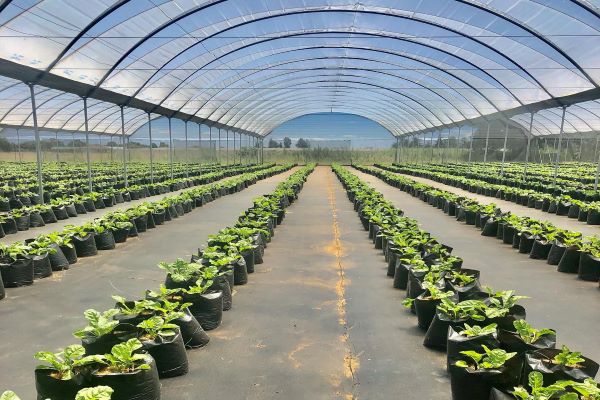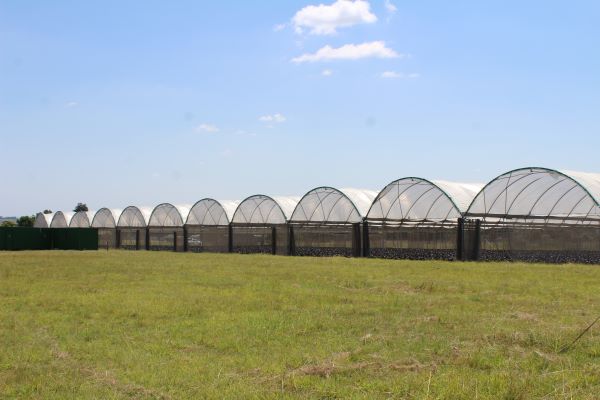Mbali Nwoko is a multi award winning commercial farmer, entrepreneur, blogger, podcaster, speaker, and columnist. She’s the founder and CEO of Green Terrace — an agribusiness farming spinach, cabbage, sweet peppers and swiss chard. The business supplies leading retailers, wholesalers, and fresh produce markets across SA.

With qualifications in industrial psychology and business science, and experience as a talent-acquisition manager in the corporate world, Mbali certainly doesn’t fit the profile of an average farmer in the country.
In 2016, she got introduced to farming after she attended an entrepreneurial workshop where she met smallholder farmer, Erick Mauwane, operating in De Deur outside Johannesburg.
“Chatting to Erick during the tea break, I quizzed him about his business. He told me he was farming cabbages and moving into pigs. He marketed his cabbages through several retailers, including Spar, in the Vaal area.”
Erick told her everything about smallholder farming and the possibilities of making it by starting small. When she got home that night, she researched the industry down to its finest details. That’s when she realised it was possible to make a decent living on less than five hectares.
During that time, her recruitment business was struggling to place people in scarce jobs, so she decided to take the jump and establish The Green Terrace a week later.
“I thought, whichever way the economic climate may go, people always need food. For me it seemed like a lucrative opportunity.”
He next mission was to find land.
Finding Land
As a township girl raised in Spruitview, in the East Rand, Mbali had a limited understanding of agriculture but Eric’s story inspired her to start.
“I grew up on the East Rand and I’ve seen lots of farms travelling to and from home over the years. Surfing on the internet led me to Plantation Farms, Costa Farms, and Gonzales Farms in Boksburg and surrounding areas,”
She approached the managers and asked them on how she could start farming and whether they knew of any available land she could lease. Although they couldn’t help her with land, they gave her a few farming tips and referrals to other farmers.

After finally securing her first land deal, it went sour despite her having ordered 30 000 spinach, 40 000 cabbage and 16 000 green, yellow, and red pepper seedlings.
Not one to give up easily, she secured a second lease of a 14ha farm, which belonged to Mama Beauty, a retired teacher whom she later formed a business relationship with.
“The farm had 8ha of arable land, with 10 tunnels and shade nets taking up 2ha, there was electricity, a borehole and a reservoir.”

This deal was a sweet one. Mama Beauty gave her the use of a plough, tractor, and irrigation equipment. She also had the benefit of a skilled labour force.
In January, Mbali and her team planted 66 000 spinach and 33 000 pepper plants earmarked mainly for Pick N Pay.
Her work ethic, determination and never say die attitude impressed Mama Beauty, who then offered her the use of the total farm acreage.
“Mama Beauty was exceedingly kind, I was happy to take over the farm, and in the process I inherited some of the crops she had already planted in the tunnels and under shade nets.”
Once the farm started selling produce, every single cent was going back into the business.
“I was buying more irrigation, implements and stock, and paying staff. I wasn’t paying myself a salary, really. That was how I gradually grew.”

According to Mbali, the farms intensively and sustainably, using data to drive processes, and consulting with experts such as agronomists to ensure that the best yields are received in the quickest time, with the use of biological products, and minimal natural resources.
Today, Green Terrace supplies vegetables to leading retailers, food-processing companies and fresh-produce markets across the country. The business also has a permanent team of 5, as well as 10 to 15 contract workers to assist with operational work during production.
Advice to aspiring entrepreneurs??
“Entrepreneurs shouldn’t go into business because they think there’s funding available. You’ve got to have a solution for a specific problem you’ve identified in the market, and be able to make money out of that. Thriving businesses are those that solve major problems. That will attract investors.”
Get South Africa’s latest entrepreneurial or business success stories delivered right to your inbox — Sign up to Entrepreneur Hub SA’s newsletter today ⬇️⬇️⬇️

eBook: 50 South African Entrepreneurs Reveal HOW THEY MADE IT





Thank you for sharing this article with me. It helped me a lot and I love it.